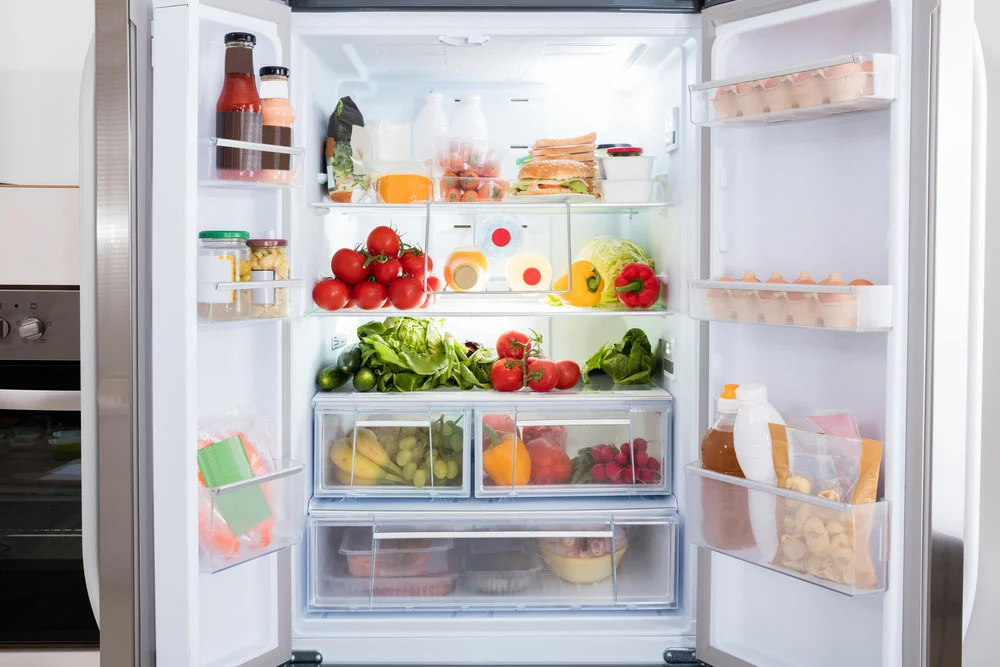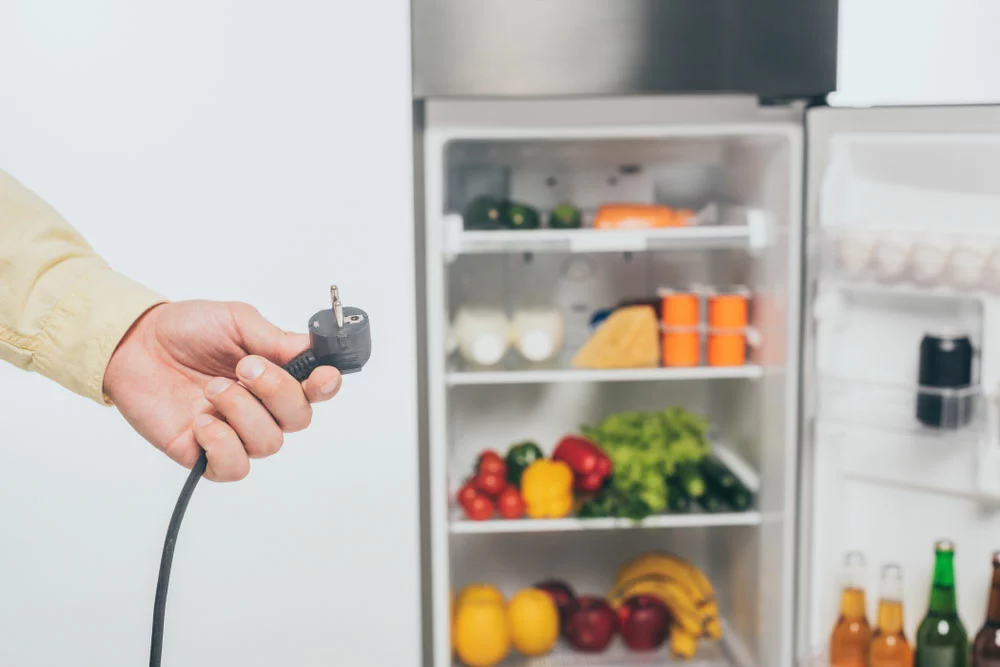No doubt, refrigerators are obviously among home appliances that have high wattage consumption. So, it’s no surprise they likely contribute to your increasing electricity bills. That’s why it’s important to understand your average fridge watts to know how to manage your consumption better and possibly reduce your bills. This article will show you how to calculate and determine your refrigerator’s watts.
What are Refrigerator Watts?

Open refrigerator
Refrigerator watts refer to how much electricity your appliance’s compressor needs to keep its compartment cool. Going below the required watts may cause adverse issues or damage the fridge. However, not knowing your refrigerator’s watts could result in a less-than-optimal performance from your solar system.
How Many Watts Does a Refrigerator Use Per Day?

A man holding a refrigerator plug
Most refrigerators use anywhere between 300 to 800 watts. However, the exact usage depends on the appliance’s age. Let’s use a fridge and freezer combo as a reference point.
Generally, the two compartments of the fridge/freezer combo may use similar wattage. However, the freezer may require more energy to generate cooler temperatures constantly. But they often come with smaller spaces.
More importantly, fridges often exhibit lower running wattage, meaning they may consume less when turned on. Why? Because refrigerators cycle on and off throughout their active duration.
You can divide your fridge’s wattage by three for an energy usage estimate. So, the results for a 500-watt refrigerator would be 167 watts. Let’s examine how many watts a fridge will use according to the running period.
Note: We’ll use Kilowatts (kWh) to determine a refrigerator’s energy needs.
| Running Period | Refrigerator Wattage | “Running” Energy Use | Electricity Used (kWh) |
| 1 year | 500W | 167W | 1,463 kWh |
| 1 month | 500W | 167W | 122 kWh |
| 1 week | 500W | 167W | 28 kWh |
| 1 day | 500W | 167W | 4 kWh |
| 1 hour | 500W | 167W | 0.167 kWh |
How to Calculate Fridge Power Consumption

Fridge in a kitchen
You can use three methods to calculate how much power your fridge consumes. Let’s take a closer look at these methods.
Use the Energy Star Rating to Calculate the Average Wattage.
Most fridges have energy star ratings providing a yearly electrical usage estimate. You can check your refrigerator’s model number online to see if it has one.
Additionally, you should see the average energy consumption if your refrigerator has an energy star rating. For instance, if the label shows 337 kWh per year, it will translate to 337,000 watts (1 kWh = 1000 W).
Interestingly, dividing 337,000 watts by 365 (days in a year) will equal 923.29 watts per day (337,000 / 365 = 923.29 wH).
You can also get the average daily watts by dividing 923.29 by 24 (hours in a day). The result would be your daily running watts: (923.29 / 24 = 38.47).
Use an Energy Meter to Calculate Power Consumption.
Don’t worry if your fridge doesn’t have an energy star rating. Purchasing an energy meter can help get your power consumption values. In truth, this method is easy to do and offers the best accuracy.
Start by plugging your purchased meter into the outlet. Then, plug your refrigerator into the meter. And that’s all you need to do. Afterward, the energy meter will calculate how much power your fridge consumes over time.
Note: Although energy meters are inexpensive, you can call your manufacturers to get the same information.
Use the Nameplate Amperage for your Calculations
Lastly, you can make calculations based on your device’s nameplate amperage. However, the results are not as accurate as the above methods. But it’ll give you something like an educated guess.
Furthermore, you can multiply the nameplate amperage by 120 to get your running power consumption. We’re using these values because most houses run on 120 volts.
For example, if your nameplate shows five amps, multiply it by 120, and you’ll get 600 watts.
Three Ways to Cut your Refrigerator’s Watts
Close Your Fridge Doors and Clean your Coils.
Avoid opening your fridge doors for extended periods. Leaving them open would let cool escape and warm air infiltrate the compartment. For this reason, your fridge would put in more work to regulate its temperature. Unfortunately, such situations would cause the device to consume more power.
In addition, you should inspect your condenser coils regularly. Dust and other objects like pet hair can easily gather and clog the coil.
Sadly, such situations would make the condenser work harder and consume more power. A clogged coil may also cause costly maintenance.
Upgrade to Energy Star Certified Refrigerator and Keep them in a Cool, Dark Location.
Fridges with energy star certifications will offer more efficiency and consume less energy. Older models consume more energy, so investing in a new device may save money on your electric bill.
In addition, avoid setting up your fridge near sunlight or other heat sources. Such situations would cause your fridge to work harder to keep its contents cool, causing the device to eat more energy.
Store Cool Food Only and Invest in New Gaskets.
Hot food and refrigerators are not a good match. You need to cool off your food before putting them into the compartment.
In truth, anything hot would cause the compressor to overwork so the fridge can maintain its cool temperature. Hence, it’s crucial only to store food at room or cool temperatures.
Also, ensure your stock your freezers to about three-quarters of their full capacity. Otherwise, your device would consume more power to chill empty spaces.
In addition, your fridge must not leak cold air. If it does, then you’re wasting a lot of expensive energy. Rubber gaskets around your fridge are likely culprits responsible for such leakages.
So, investing in new gaskets is worthwhile if you feel the previous ones aren’t as effective.
What Affects Fridge Power Use?
Several factors can affect your refrigerator’s actual power consumption. Some of these factors include.
Size: The bigger the fridge, the more energy it will consume. Devices like side-by-side refrigerators will have higher power draws than mini-fridges.
Usage: Frequently holding the fridge door open would cause the fridge to consume more power. Otherwise, the warm air would override the cool one, causing the compartment to lose efficiency. In addition, empty fridges would consume more than stocked ones.
Age: Older refrigerators don’t have as much efficiency as newer models. They may consume more power than you expect. So it’s recommended to invest in variants with energy star ratings.
Type: Not all fridges are the same, so it makes sense that various types will have different power consumption. On this note, commercial fridges will need 10x more energy than regular home variants.

Commercial Refrigerator
Season: Refrigerators often use more power during summer. The season has higher ambient temperatures, causing the device to work overtime.
How Much Does it Cost to Power a Refrigerator?
You can get this answer with a little calculation. The U.S. Department of Energy believes refrigerators operate up to eight hours daily (factoring in the on and off cycles). So, you can multiply your refrigerator’s .805 watts demand by 8 hours. You should get 6,440 watts per day.
That’s not all. Divide the value by 1,000 to get 6.44 kWh.
Additionally, the average American should receive a 12 cents charge per kWh. So, running a fridge would cost 77 cents daily, or $23.10 monthly.
How Many Solar Panels do you Need to Run a Refrigerator?
Usually, fridges need 300 to 800 watts to keep running. Also, solar panels generally offer 350W. Hence, going solar would require two or three extra panels to run refrigerators properly.
What Battery Size Can Backup a Refrigerator?
Most home batteries can properly power a refrigerator since they have 4 to 5 kW ratings or higher and over 10 kWh of usable energy. Fridges can run comfortably without depleting the batteries fast.
Rounding Up
Refrigerators are essential appliances that most homes possess. But it could be one of the culprits for your high electricity bills. Thankfully, there are ways you can determine your device’s average watts.
Additionally, knowing how much power your fridge consumes would help ensure your home runs properly on solar. We’ve discussed some methods in this article to help reduce your refrigerator’s power consumption if it’s a problem.
Do you have any questions? Feel free to reach us, and we’ll be happy to help.
